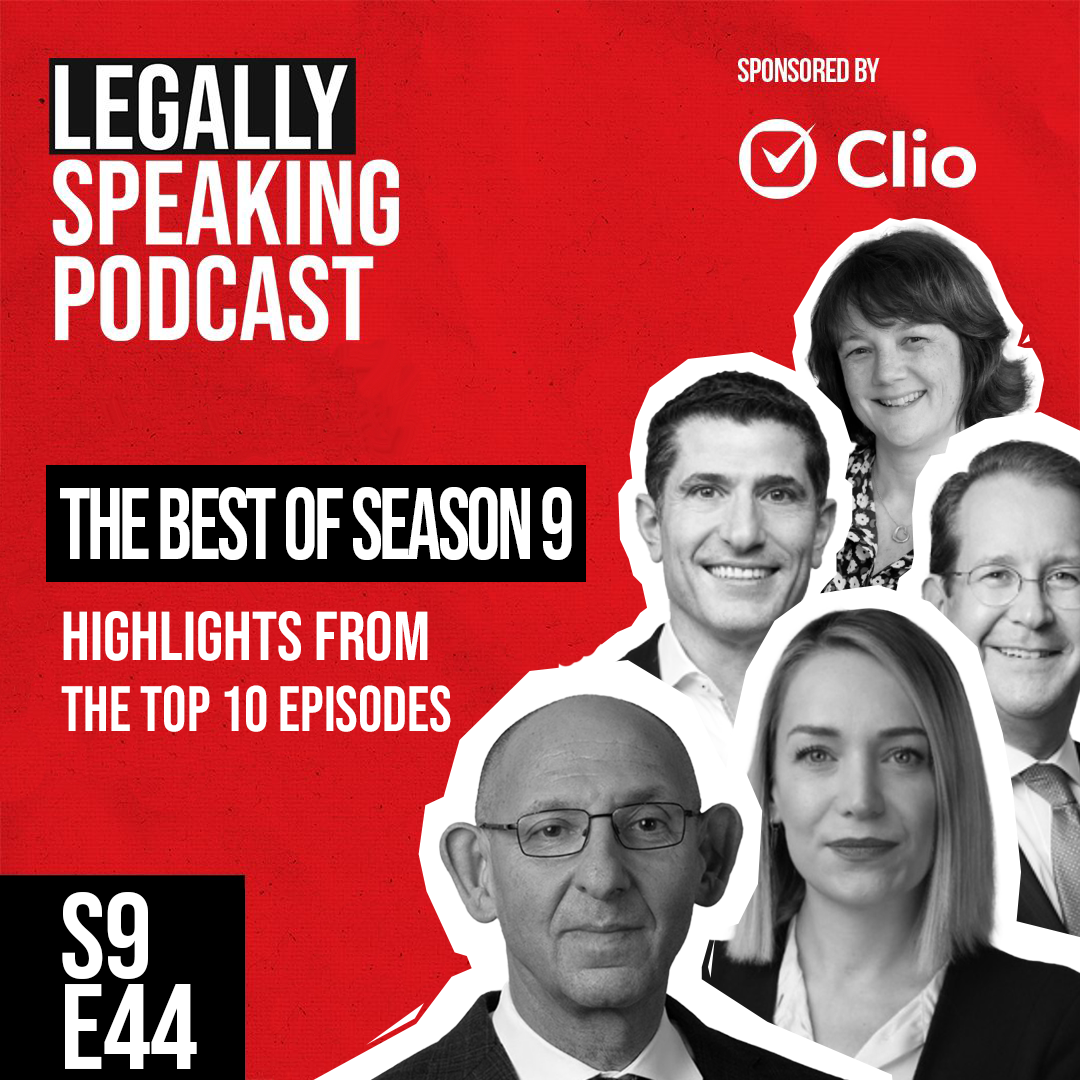
Special Edition: The Best of Season 9 – Highlights from the Top 10 Episodes – S9E44
Welcome back and thank you for being part of the Legally Speaking podcast journey. We appreciate
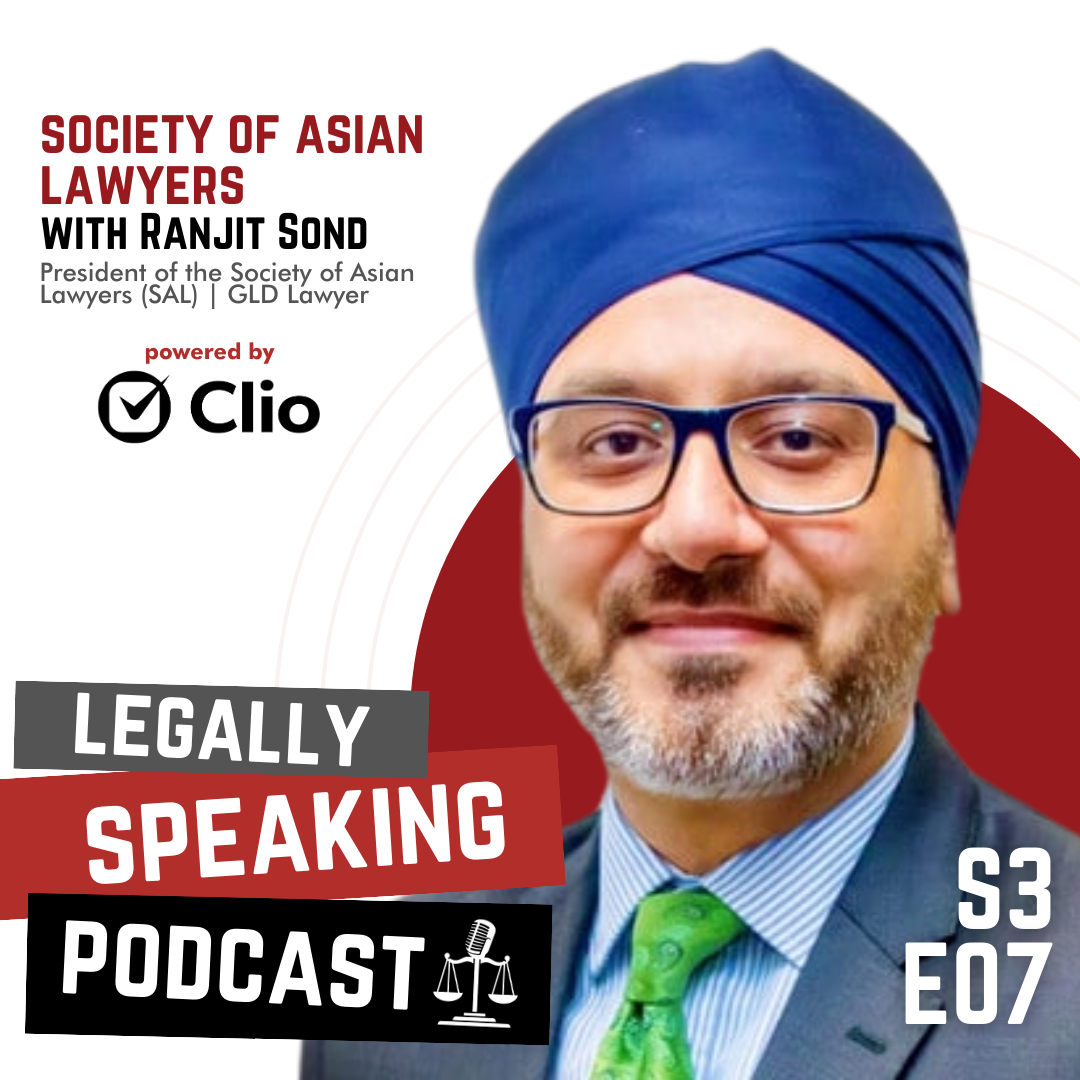
This week on the Legally Speaking Podcast, Powered by KC Partners, our host Robert Hanna is joined by Ranjit Sond.
Ranj is a Lawyer working for the Government Legal Department, a Visiting Lecturer at BPP, a member of British Association for Sport and Law and the current President of the Society of Asian Lawyers (SAL)!
Rob & Ranj discuss a number of things, from Ranj’s bold decision to re-train as an internet/social media solicitor after 20 years as a personal injury lawyer; to his involvement with East Ham International FC, and of course SAL!
[0:00:00.0] Rob Hanna: Welcome to the Legally Speaking Podcast powered by Kissoon Carr. I’m your host Rob Hanna. Today I’m delighted to be joined by Ranjit Sond. Ranj keeps himself very busy. He’s a lawyer working for the government, legal department, a visiting lecturer at BPP, a member of the British Association for sports and law, and the current president of the Society of Asian Lawyers, SAL. So, a very big welcome Ranj.
[0:00:26.0] Ranjit Sond: Thanks Rob, thanks for having me.
[0:00:27.7] Rob Hanna: Absolute pleasure. I’ve been dying to have you on the show for ages. Before we go through all your amazing work, which I know we only touched on the tip of it in the introduction, there’s a lot more as well. We do have to have our icebreaker question on the podcast which is around Suits.
On a scale of one to ten, ten being very real, how real would you rate the hit series Suits in terms of its reality?
[0:00:53.4] Ranjit Sond: Right, I’m going to go with two, two out of ten because I would love to work in a legal profession where I could wear a really nice dapper suit if I could afford it like Harvey Specter and just you know, go around to offices and strong-arming people into doing what you what them to do.
I think some of your other guests have mentioned, it’s just kind of fantasy isn’t it really? It’s a good program and I do like watching. I would say two out of ten, Rob.
[0:01:18.1] Rob Hanna: Yeah, fair enough. The lot of the real legal listeners will agree with you. I mean, I like a bit of Hollywood, so I think I’m giving it around a four or five. I think you’re right, in terms of the actual reality of it, it’s probably going to be definitely below five. So, let’s start at the beginning. Tell our listeners a bit about your family background and your upbringing?
[0:01:37.8] Ranjit Sond: Right so, I was born and bred in East London on the Eastham/Manor Park border if anyone knows that. I’m the youngest of seven children and I was the first in my family to do law. In early days certainly, there wasn’t much about work guidance, just no one to ask for career advice, I was the third in my family to go to university ‘cause I’ve got an older sister and brother, who had been, so that already paved the way for me really so. I already knew I wanted to go to further education, because I’d seen what they had done and what they were doing, and my dad was always one for education. Coming from a fairly modest & poor background, he didn’t have that opportunity coming from India, so he wanted to give us that opportunity, you know, and instil that into us. My dad worked for the Royal Mail in the sorting office. My mom was a full-time mom and also a part-time seamstress at home. So, I went to a local comprehensive, then I went to a local college to do A levels. I went to Derby University to do law.
By that stage, I was pretty much set on law because, I’ve been exposed to bit of law. I mean, one of my sisters unfortunately got divorced in the 80’s, and that was a kind of eye-opening experience for the whole family. I remember, I accompanied her to some of the meetings with a lawyer when we started.
And the first thing that struck me was that, I quite like these guys offices and you know, it was quite emotional for my sister, so just being there in that to help her. So, that was my first exposure to law and then when I was 14 or 15, the school arranged a one-week work experience. And they were asking everybody, “What would you like to do, what’s your ideal occupation or where would you like to be placed?”
And I remember saying law firm or GP surgery, Cause at the time I wasn’t sure lawyer or GP, then I’m like, why I was saying GP? Anyway, never really that science minded or anything like that. So, they arranged a week at the local legal aid firm in Eastham, I was there for a week. I’m really grateful to them actually, and even to this day, I’ve got to say thank you them if I ever saw them again. Because they didn’t just have me photocopying. A lot of kids that age are sent off to work experience and they came back with the same story that they spent the majority of the time unfortunately photocopying, or doing admin work.
[0:03:51.9] Rob Hanna: Yeah.
[0:03:51.1] Ranjit Sond: So, the guys at this firm really took me under their wing and I went to the court, saw them in action at the local magistrate’s court I went to the cells as well at the court, you know, to see the client, and it was a real eye-opener for a 14-15-year-old.
There was photocopying in between, but I got a real broad look into life in a law firm and what sort of, you know, couple of solicitors do and I was hooked to them and they asked me to come in the summer holidays which I did, and the following summer holidays as well. So, yeah so that was my kind of the brief history and introduction to law.
[0:04:22.7] Rob Hanna: Great. And so, from there then, you’ve worked and done some fantastic things but let’s break it down. Tell our listeners about your legal career to date. I understand after spending almost sort of twenty years as a claimant personal injury lawyer, you took the bold decision to sort of retrain as an internet, social media solicitor.
So, tell us a bit about your experience as prior to that, and then the rationale behind that bold decision.
[0:04:46.4] Ranjit Sond: So, the holy grail is obviously gettinga training contract after you do the LPC, I mean I kind of struggled with the LPC a little bit, just it was an incredibly break neck speed I thought, just to get through it, but you know, I got through it which is good. And then it was, you know, next step or the next hurdle was the training contract.
And I was out of work for a year. I didn’t get a training contract for a year after the LPC, but I filled my time with doing voluntarily posts in law firms. So, I worked as a paralegal, and I worked around as a legal assistant for local counsel just to build up my experience in my CV. I then got my training contract with a legal aid firm in Camden Town, which sadly no longer exists.
But I did training, and my training was in – I did a personal injury, housing law, a bit of immigration and crime. So, it was all kind of bread and butter, high-street stuff really, which was really exciting, and they taught me so much. So, I was there for two years as a trainee, I stayed on for a further two years. And that’s when I started specializing in claimant personal injury and also housing.
So the housing was landlord and tenant work and also homelessness. So, I did that for another two years, and then I moved to a solely personal injury firm up in Romford. I was there for three years before my wife and I left work and we went travelling around the world. So, got on a plane and went round the world for six months. It was lovely, came back. And then, yeah – came back into personal injury- because personal injury was really my kind of my first love, really if you like. So, I stayed within that field.
Moved once more to a national personal injury firm and I was there, and I thought that was home really, because I really liked the ethos and everything there and the work. Around 19-20 years down the road, I then made a decision to actually – I first left employment and started to consult. And the reason for that was, every year I see, you know, I was finding that the pressures were increasing, billables, hours, I guess what you’re bringing in.
And everyone knows you have targets, but if you exceed your targets one year, you’re almost punished the following year because they increase the targets further, it’s like oh okay, maybe you kind of achieved this quite easily or you know, quite comfortably. Let’s just see if we can get a bit more out of you, and then I wasn’t the only one.
So, you know, and it felt that in private practice in certain firms the culture was, “Let’s see how much we can squeeze or ring out of this person.” And that was getting me down actually. I didn’t realize at the time that my mental health was actually suffering a little bit at the time. So, I left that. I didn’t have any job to go to, I just thought I’d had enough. So I just left, with three-months’ notice and it was really liberating, as a massive weight lifted off my shoulders and I just felt free and great for the first time in years. I had three months out of doing nothing, over the summer with kids and then I thought, I should really try to find some work again.
So, then I started contracting or consulting, again in personal injury but then there was an opportunity to retrain in internet social media law, and I got that from a friend who had actually gone the same way from personal injury into this growing area of law. I did for a short while, I mean, it was a bit shorter than I wanted it to be. But just in the end the opportunity wasn’t as great as that could have been. I think there were some limitations there, and it was a small firm, I think. I think they were just trying to grow too quickly. So, we departed company after about eight months. I learned so much and it’s a little bit advertising, I’m also doing a masters in sports law. So, yeah it was a great learning curve.
But then after I come back – well I say come back, I worked for GLD many moons ago as a contractor, so now I’m with the Government Legal Department, and I’ve been here for 18 months almost.
[0:08:28.5] Rob Hanna: Yeah, tell us a bit more about what it’s like working for the GLD and what do you get up to, what’s the day-to-day life?
[0:08:34.9] Ranjit Sond: It’s a really lovely work environment. I mean everyone is – they’re all very fantastically qualified I think, and really fantastic lawyers. There’s a good work-life balance, everyone works hard but they know that there is life as well. So, you know, I just thought as a balanced life mostly so, great work goes on there. So, what I do personally there, I’m doing a personal injury again but from a defendant side, so I’ve gone and switched sides.
And also, inquest work so colonial law. I look after Ministry of Justice and they look after the prison so, any claim arising out of a prison really so, be it personal injury or getting custody. And then, I suppose at the moment we’re locked down, working from home, I normally start my day about nine o clock. And they’re interesting and varied cases though no two prisons are the same, there’s various issues depending on which prison that you’re dealing with really.
[0:09:26.4] Rob Hanna: Yeah, and you’ve touched on it there with lockdown and COVID-19, how has that impacted your day job?
[0:09:32.9] Ranjit Sond: I’m very grateful actually, I’m very grateful that I’m in a job and in a position where I can work from home. I know many people are not that fortunate, so I’m grateful for that. The workload hasn’t changed, because we’ve always been geared up to work from home because I used to work from home once or twice a week anyway prior to COVID.
And the nature of our work, we are quite often on the road, with laptops, as attending inquestt around the country, I was in Nottingham, once, I’ve been to [?] you know, and my colleagues have been up to Preston Lancashire. So, we travelled across the country. So, we are pretty geared up to work remotely anyway.
So, the transition wasn’t that difficult at all, and the workload thankfully, it’s kind of still there and we’re expecting further claims throughout the COVID situation as well from prisoners potentially.
[0:10:21.4] Rob Hanna: Great, thanks for sharing that. And I think it was really fascinating just learning your journey and the fact that you did retrain as well. It should give people confidence that if they want to make bold moves you know, go for it, I guess from your inspiring comments there. And that really is just one arm of what you do Ranj, obviously the day job. So, we must talk about everything else. And you know, one of the roles you have is the President of the Society of Asian lawyers, SAL. For those perhaps new to the society, what does it do and how long have you been president there?
[0:10:48.5] Ranjit Sond: Right, yeah. So, Society of Asian Lawyers has been around since the early 1990’s. It represents Asian lawyers in the UK, one of our main objectives is to improve diversity in the legal profession. People might say, “Well, there isn’t a problem with diversity” but when you break it down, there are and there aren’t. I mean, entering the profession there is less of a problem now.
So, the recent focus has been trying to penetrate the more senior positions at boardroom level. And also, in the Judiciary we run a program of events. We have three events around the country, 2017 and 2018 about the Judiciary. Those events were diversely just highlighting to our members about a possible career as a judge. And we sowed the seed, it was really to kind of open up the idea to them. So, we had a panel of Asian judges who were recently qualified, and they kind of explained and shared their stories. And it was really inspirational and kind of sow the seed to get people thinking because in the judiciary, there’s only seven percent of judges are from Black and Asian minority ethnic backgrounds. And when you break that down further, the seven percent are largely concentrated in the lower courts and the tribunals. Once you get to the court level and above again, like in law firms, the numbers really drop away. So, it’s about supporting our members into getting into those types of roles in the future. We also work quite closely with the SRA and the Law Society behind the scenes, there’s lots of things that we can’t always publicize and advertise actually, but there’s lots of work going on at the background and more recently, for example, we’ve been working with the SRA as part of a focus group with other similar groups as well, on the new SQE exam which comes in September 21.
So, you know, there’s work going on behind the scenes all the time. I’ve been President now since September 16, we have elections every year, so everything and we democratically run. So, anyone could stand for election. And the next election where in decision would be December this year.
[0:12:56.8] Rob Hanna: Great. Okay, well thanks for that. And I must say, you know, that’s a very good high-level overview of what you do. Becase, I know you do so much meaningful work for the profession. And you do some awesome events, and naturally in light of COVID-19, they’ve shifted online. And I know, you’ve done some fantastic webinars via the likes of Zoom on mental health awareness and International Women’s Day which you finally got to do. How have you found running those events virtually?
[0:13:21.2] Ranjit Sond: I think that they were a revelation actually. I don’t know why, why we’d ever want to kind of travel across London to get a seminar, again I thought it was very well run, you can just stay at the comfort of your home or your office wherever you might be, and kind of get connected. There are so many platforms now that you could use.
We used Zoom for our two events. So, there’s one in May, on mental health which is a cause close to our hearts, mental health in the legal profession which hasn’t been spoken about until the last year or so, really. So, we’ve found them actually quite well-attended as well, and what I found really encouraging Rob is that, on a Zoom event, people can turn off the camera if they don’t want to be seen which is fine.
And we found much more interaction because of the chat feature that you have; so people are leaving comments as you’re going along and asking questions whereas I know from my experience of running these events in person, people are quite often too shy to ask questions because the microphone goes round that Q and A at the end. And it sometimes takes a brave person to say, “Yeah, you know” and pick up the mic and ask the questions. So, we’re finding much more engagement really with our members this way so, and I’m enjoying it. I think it is good.
[0:14:31.7] Rob Hanna: I think the events you’ve done have been absolutely fantastic and you’re absolutely right, I think you’ve been quite modest there and they’ve been fantastically attended. So, it’s testament to what you and all the committee and all the team are doing. And just on that, I mean, Kissoon Carr had the immense honour of cosponsoring last year, the 20th annual Asian legal awards which was amazing at the Royal Lancaster Hotel.
I loved every minute of it. And clearly with COVID, what does that mean for the 2020 Asian legal awards. Are they still going to be happening? Is that going to be in sort of some virtual capacity or TBC?
[0:15:02.0] Ranjit Sond: It’s our flagship event. Thank you to you guys and Kissoon Carr for sponsoring last year and for attending and for helping us make it such a wonderful night, it was a really cracking night. and it was great to see you there and your guest and so many friends and supporters over the years. So yeah, that’s our flagship event.
That’s the one time of the year we really let our hair down specially for the champing and celebrating Asian lawyers in the profession. It’s also a great networking opportunity, and it’s a real five-star event. And so, we’re really going to miss that because we’re unable to hold it in person here so, there won’t be the grand affair at the Lancaster this year, I’m afraid.
I think that’s the right decision position because with the guidance as it is, you know, it’s really uncertain as to what’s going to happen in October. Because if we have a date really, it was going to be in October but it’s just not feasible to have it but also there’s a side to it that we were considering, you know, we need to be sensitive as well.
I mean, we’ve lost an awful lot of people unfortunately. A lot of people died this year from COVID and so we were thinking whether it’s the right thing to do, to have a celebration of that side even if we’re allowed to, you know, so. What are we going to do? So, this is still being worked on.
So, I can’t say an awful lot just yet but, I hope there will be some announcements coming up quite soon, we want to mark it in some way. There just won’t be a live, lavish affair like we normally have in the Lancaster I’m afraid, but there’ll be something to mark an awards night of some kind, not entirely sure yet, we’re just trying to put some detail together on that, Rob.
[0:16:28.3] Rob Hanna: Yeah, and I’m sure it will be spectacular whatever you do having had know, have the privilege of attending the event. So yeah, wishing you lots of luck with that one. And moving on to a shared passion as well that you and I have Ranj, of sport. You and I, you may know we recently had Sky Sport News presenter David Jones who runs Super Sunday and Monday Night football come on the podcast.
And you know, I’m a very happy Liverpool fan right now, and you like to keep very busy with the day job and SAL but what else do you do perhaps to add value or that is quite dear to your heart because I know you’re a keen sports person, is there anything else you get up to that you’d like to share?
[0:17:04.7] Ranjit Sond: I’m a big football fan as you know. For my sins, I’m a Westham fan, it’s never pretty really, is it for us? It’s never easy. I would like to say congratulations to you and your team, I think it’s thoroughly deserved, really in the end by far the best team. By stark contrast, are Westham on the other end of the table, fighting for our lives.
I’ve been a massive football fan. Actually Rob, what you don’t know is my first ever team was Liverpool.
[0:17:32.5] Rob Hanna: Really? Now that is…
[0:17:36.1] Ranjit Sond: When I was six years old. Liver glory coming to my stage because I think it was Dudley, team Dudley. I was a big Dudley fan I thought, he was an amazing player. But yes, I switched allegiances when I was eight-year-old. I also a coach at a local community-based football team called East Ham International FC.
I mean they’ve been around since 1976. They’ve won three adult teams in the earliest leagues in the East End of London and Essex. The focus last year also has been on the children, in getting kids involved, we’ve been running a training camp and I’m coaching some under 10’s which includes my two kids as well. That’s how I really got into that actually, you know, we’re playing there.
And I knew, you know, the coach and I used to coach before about ten years ago, a friend of mine and I coached them as a Cuffley FC up in Hertfordshire back in 2009 I think it was. So, I’ve got a level one badge already, so kind of just pick that up again so. Yes, Saturday mornings 9 to 11 is training. So, I’m kind of passionate about that. We put together training drills and it’s about developing their skills and their mentality.
They’re only nine ten but they’re kind of – they’re absolutely crazy for is all we can say. We’re hoping to get them into a league starting in this September but we’re still waiting on local FA about what they’re going to do.
I played in a football team as well, for years. Since I was an 18-year-old, I was the captain of a team or two, in my time. So, I’ve always played in some capacity, now in my more advanced years, it’s only natural that I fall into some coaching role, I think.
[0:19:13.9] Rob Hanna: Yeah, good stuff. And yeah, I think that’s fantastic, and fingers crossed you do get into league in September, and you’ve followed your passion with sports even more so combining it with the law. So, I understand you’re currently studying the LLM sports law part-time at De Montfort university at Leicester and you’re a member of the British Association of Sports and Law that I mentioned from the outset. Do you want to just tell us a little bit more about that?
[0:19:37.5] Ranjit Sond: So, for the studying part time, the masters is – I don’t know what I was thinking actually. It’s not as easy as I thought, it’s really quite hard. And the idea was to combine my two passions, sport and law. I mean, that all sounds crazy about sport not just for football, but tennis, cricket, and probably what not, my wife gets annoyed – just sports all the time but no, so yeah, the sport – yeah, the idea was still there to kind of try and do some kind work in sports law. I mean, I don’t believe it’s too late, I think if you’ve got a passion and you want to go for it, you know, I think that you can. I took a bit of time in that last year because I left for personal reasons last year and I took some time out.
But yeah, I just came back to it now. So, last six months really generally it should be done and dusted. So yeah, sports law, distance learning, so going into De Montfort once a term which at the moment we can’t because of COVID. I like learning. I like learning, you kind of learn about new things and this is a sort of natural step, more of a hobby which hopefully will transpire to something more concrete I think hopefully.
[0:20:40.4] Rob Hanna: Yeah, and it doesn’t stop there because you also teach the LPC, I understand, part-time to students at the University of Western England and BPP Cambridge and mentor students at the University of Derby. Do you want to just tell us a bit about more of that?
[0:20:54.9] Ranjit Sond: The teaching thing came about because I had a contact at University of Derby. And so, the University of Western England deliver the LPC at Derby so they were looking for some practitioners who could come in and really offer some current insight into the kind of work and teach the – it was like the personal injury module and the civil litigation module.
So, I got into that, that way, and then I kind of moved on from there, because the trip to Derby, every other Saturday was quite hard, and then also with the football training that was on the horizon, it kind of clashed so, I’m now doing it at BPP in Holborn instead which is a lot easier. I was in Cambridge as well, but that again was on a Saturday, so that was going to clash with my football commitment.
So, I’m now at Holborn and well, that’s all on hold this year because of the COVID and also, they had a slight restructure of their modules, but yeah, I mean I really enjoy the teaching. So, it was just quite ironic, because I absolutely hated learning the LPC, when I was a student on the LPC I actually hated it, but teaching is okay.
I enjoy giving back and it’s surprising how much you know when the students actually ask you questions off script and being able to answer to them but I like to think I’m a people person and I get along with the students and I really enjoy that as well.
[0:22:12.9] Rob Hanna: Good stuff. And I believe law does run in your family as your wife is also a partner at a law firm. So, how do you both sort of balance family life, looking after children, you know, yourself being a lawyer, president of SAL, and all these other things. You know, a lot of people listening in will be like “Wow” but you know, with you both being so busy, how do you manage that with sort of family time as well and family life?
[0:22:35.4] Ranjit Sond: Yeah, it can be quite hard. I mean, I think the major advantage of having your partner is also in law, if she gets it then she understands the pressures, she understands if I’m moody one day, you know, and so she understands fully what it entails. In fact, she’s a partner so she has even more pressure and more responsibility.
I’m really lucky in that sense, we just work, we just click, I think. It’s kind of – we kind of complement each other and you know, there’s no pressure of why you’re working late today or, you know, it’s complete understanding of our roles and as long as one of us is with the kids. And we do try and always arrange, kind of arrange it so that, it’s just that a phone call, I mean when we were at work and something came up.
We call home and say, “Stuck at work, you’re going to be with the kids” and we have set days anyway, but occasionally you have to deviate from those days. But yes, you should have a good understanding partner which helps immensely and babysitters as well, they help. But we’re both very passionate, both very ambitious. But then, you know, weekend times and evenings we do spend, and we do make sure that we make time for the kids.
[0:23:47.6] Rob Hanna: And what do you guys been up since the down time? Because you got so much going on, you know, you talked about your love for sports and everything else and bits and bobs. What do you tend to try and do just sort of chill out time?
[0:23:55.5] Ranjit Sond: The chill out time with the boys at the moment is playing football in the back garden because they actually love it, playing a match right but we do like to watch a film as a family, something on Disney or yeah, something that and we can all snuggle up on the sofa with the kids and just kind of watch a movie together. Although one of the two does like to give quite a commentary, all throughout it. So, we’re working on that.
[0:24:17.8] Rob Hanna: Did they get that from you Ranj?
[0:24:19.9] Ranjit Sond: No, I don’t know what you’re talking about! Yeah. Possibly.
[0:24:25.3] Rob Hanna: As we look to close then Ranj, I’m sure a lot of people listening will be fully inspired from your journey and you know, what you’ve done, what you’ve achieved and what you’ve managed to do. And you know, very honestly spoken about how you’ve found the challenges around the way but to get some prestigious, you know, roles as you say, as current president of SAL and everything else. If people want to sort of get in touch with you, what’s the best way or platform to do that, is it sort of LinkedIn or what’s the best way for them to get in touch?
[0:24:51.4] Ranjit Sond: Yeah, absolutely. I’d be really happy to talk to anyone about anything really, say if someone has a little to share about their own careers or yeah, anything at all. I’m on LinkedIn, I kind of check that regularly. That’s probably the best way, just drop me a message on LinkedIn, I’d be happy to connect. Yeah.
[0:25:07.7] Rob Hanna: And if people are interested in SAL, want to get involved in this or – we’ll probably share some links after this in all of the marketing materials. But is there – do you want to give a shout out to the website for that?
[0:25:16.8] Ranjit Sond: Yeah, it’s free to join, and it’s not just for Asian lawyers, we’re an open organization to anybody and everyone. It’s free to join if you go to societyofasianlawyers.co.uk, there’s a membership platform in the homepage and it’s a very quick two-minute form to fill out and then you’re on the mailing list and you’re a member. So, it’s free to join, and get involved. We look forward to seeing you there.
[0:25:41.5] Rob Hanna: Brilliant. Well, Ranj from all of us, from the Legally Speaking Podcast, thanks an absolute million. It’s been a real pleasure having you on, listening to your journey. Truly, truly inspiring as I say, wishing you, all involved at SAL, and all your wider pursuits lots of continued success from us. Over and out.
[0:25:59.3] Ranjit Sond: Thank you. Well, thanks for having me, and I wish you the best too. Thanks a lot.
[Audio ends] [0:26:04.0]
You may also tune in on Goodpods, Apple Podcasts, Spotify, or wherever you get your podcasts!
Give us a follow on X, Instagram, LinkedIn, TikTok and Youtube.
Finally, support us with BuyMeACoffee.
🎙 Don’t forget to join our Legally Speaking Club Community where we connect with like-minded people, share resources, and continue the conversation from this episode.
Sponsored by Clio – the #1 legal software for clients, cases, billing and more!
💻 www.legallyspeakingpodcast.com
📧 info@legallyspeakingpodcast.com
Disclaimer: All episodes are recorded at certain moments in time and reflect those moments only.

Welcome back and thank you for being part of the Legally Speaking podcast journey. We appreciate

On today’s Legally Speaking Podcast, I’m delighted to be joined by Brett Colvin. Brett is the
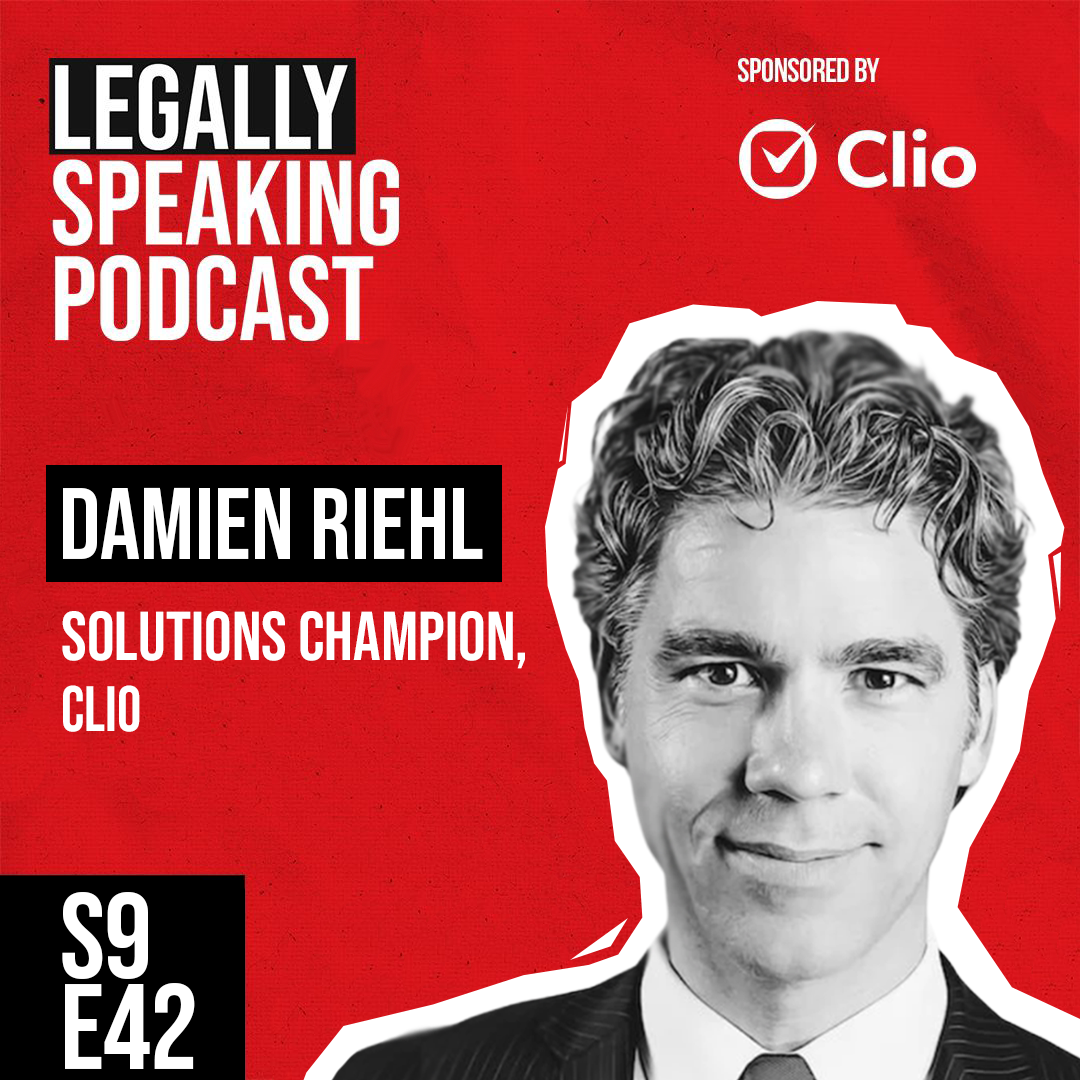
On today’s Legally Speaking Podcast, I’m delighted to be joined by Damien Riehl. Damien is a

Event Overview:In 2024, the Legally Speaking Podcast and HiveRisk founded a unique law firm leadership strategy
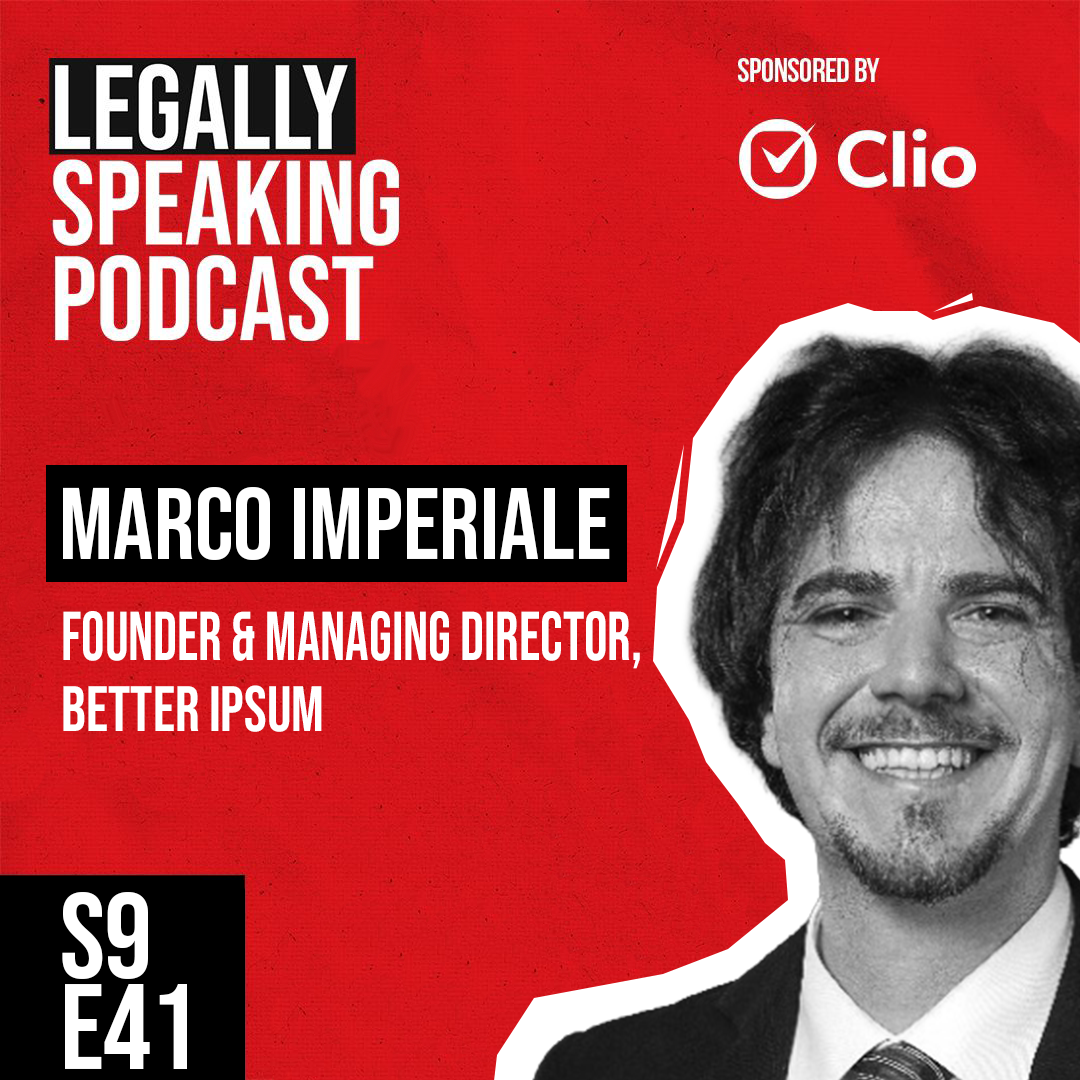
On today’s Legally Speaking Podcast, I’m delighted to be joined by Marco Imperiale. Marco is the
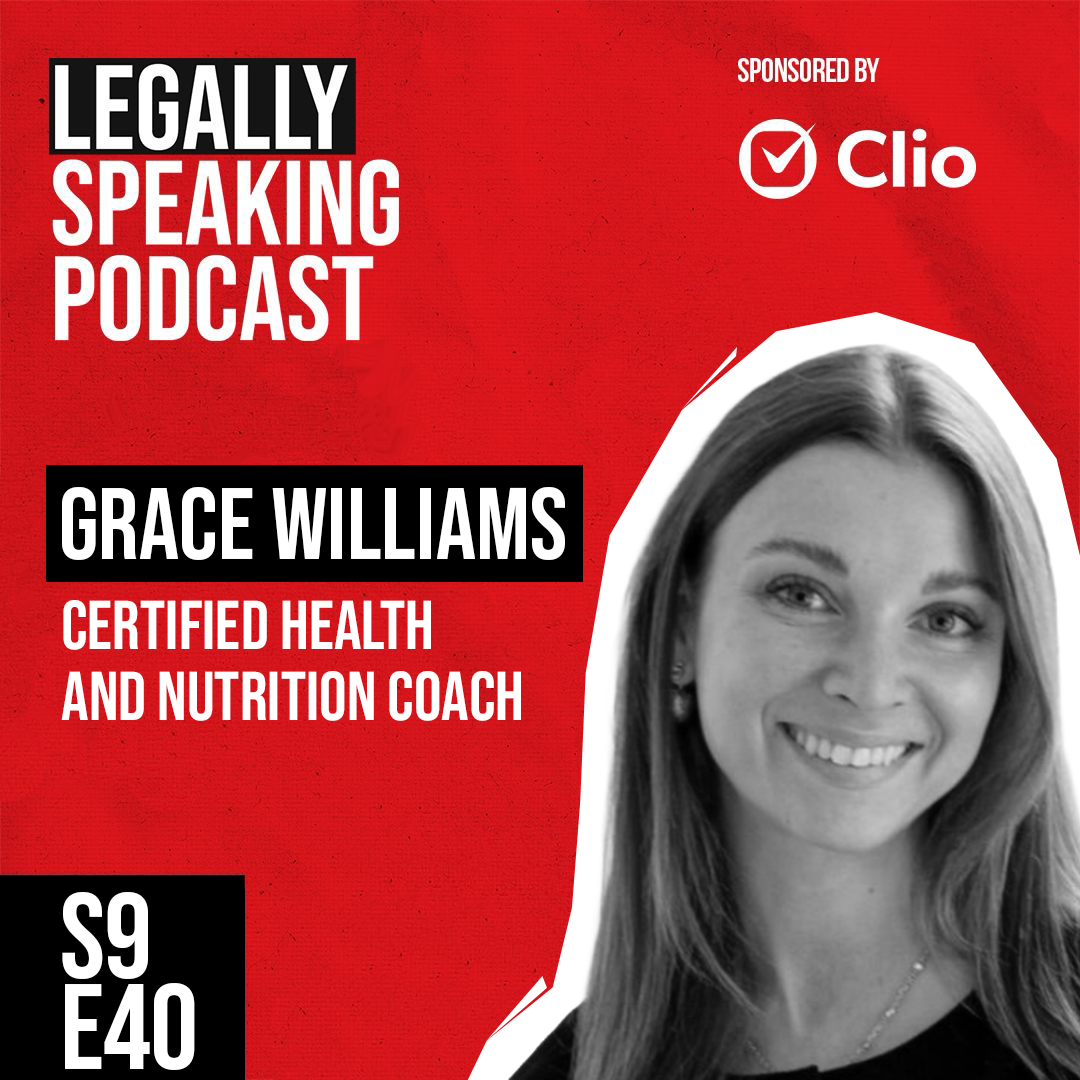
On today’s Legally Speaking Podcast, I’m delighted to be joined by Grace Williams. Grace is a

*DISCLAIMER* All episodes are recorded at certain moments in time and reflect those moments only. The podcast does not support or associate itself with any inappropriate behaviour or actions that may have occurred after recording.